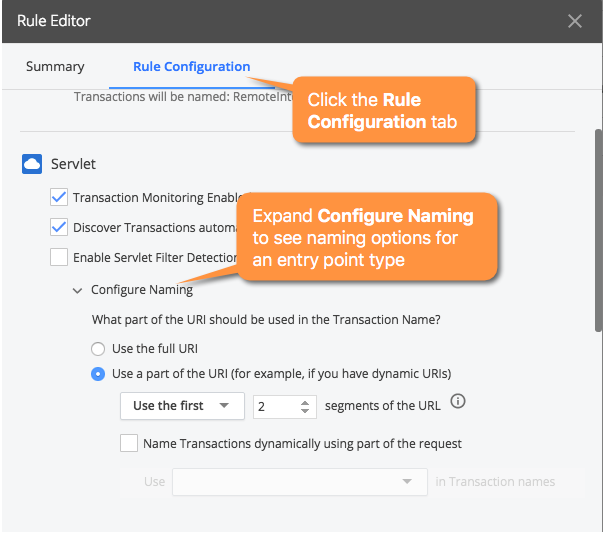Download PDF
Download page Automatic Transaction Discovery Rules.
Automatic Transaction Discovery Rules
Each AppDynamics app agent type has a default automatic transaction discovery rule that applies to all the entry points for that agent. When an agent identifies a business transaction that matches an automatic transaction discovery rule, it names the business transaction based on naming rules for the entry point type.
Automatic Transaction Naming
The naming logic varies depending on the application technology. For example:
- For web-oriented technologies that have URI entry points such as Java Servlets, detection rules name the transaction using the first two segments of the URI by default. See URI Based Entry Points.
- For message-oriented technologies such as an asynchronous message listener or message-driven bean (JMS), the agent names the business transaction for the destination name (the queue name) or the listener class name (if the destination name is not available.)
- For Web services, the agent names the business transaction for the Web service name plus the operation name.
Customize Automatic Transaction Discovery Rules
You can customize automatic transaction discovery rules as follows:
- Add an automatic transaction discovery rule for an agent type.
- Enable or disable different types of automatically discovered entry points.
- Customize transaction naming for some entry points, such as most URI-based entry points.
To access the Rule Editor, double-click an Automatic Transaction Discovery rule for an app agent. Alternatively, you can create a new automatic transaction discovery rule for the agent type by clicking Add. Clicking the Rule Configuration tab displays the entry points for the automatic discovery rule.
When you edit, delete, or change the scope for an automatic transaction discovery rule, the Controller UI performs validation to ensure each tier has the correct automatic discovery rule available for its agent type.
If you are using the Java Agent you can preview the effects of your customizations before you apply them in production. See "Edit and Preview Transaction Discovery Rules" on Business Transaction Discovery Sessions.
Disable Transaction Monitoring for Entry Points
Automatic transaction detection rules have a Transaction Monitoring Enabled checkbox for each entry point type to control automatic discovery. By default, all entry point types are enabled. When you disable discovery for an entry point type, the agent stops counting, measuring, and recording all activity for that entry point type for the scope where the rule is applied.
The Transaction Monitoring Enabled configuration affects custom match rules in the same scope for the entry point type. For example, if you disable POJO monitoring in the Java Default Automatic Transaction Discovery Rule for a scope, the Java Agent will not discover any POJO transactions for the scope.
Following are the cases when you might want to disable monitoring:
- You know that you don't want to monitor any business transactions of a specific entry point type.
- You want to monitor transactions from a downstream call.
For example, consider an application where Servlets implement Spring Beans and you are interested in monitoring the transaction starting at the Spring Bean level. Disable Servlet monitoring and the auto-detection rule for Spring Beans will be the entry point for the transaction.
Disable Automatic Transaction Detection for an Entry Point Type
If you want to continue monitoring custom match rules, you can disable Discover transactions automatically for <entry point type>. When you disable automatic transaction discovery, the app agent stops reporting metrics for previously-detected transactions for the now disabled entry point type. The agent only detects transactions based on custom match rules. However, disabled transactions are not deleted or excluded. See Organize Business Transactions for information on deleting transactions.
- The agent does not discover any new transactions based on the Default Automatic Transaction Discovery Rule for the disabled type.
- The agent no longer auto-detects calls to methods and operations of the disabled entry point type.
- Custom match rules for the entry point type remain active and the agent reports metrics for transactions resulting from custom matches.
- Exit point detection remains enabled.
The Discover Transactions automatically configuration does not apply to POJO entry points or POCO entry points.
Customize Transaction Naming for an Entry Point
To view and edit the business transaction automatic discovery rules, go to Configuration > Instrumentation > Transaction Detection.

To customize transaction naming for an entry point type, double-click a Default Automatic Transaction Discovery rule for specific agent type. Click the Rule Configuration tab to see entry points for the rule. Entry point types that have customizable naming options have the Configure Naming expander, as shown below.

For more information specific to customizing naming for URI-based transactions, see URI Based Entry Points.
You can also customize transaction naming using a Custom Match Rule.